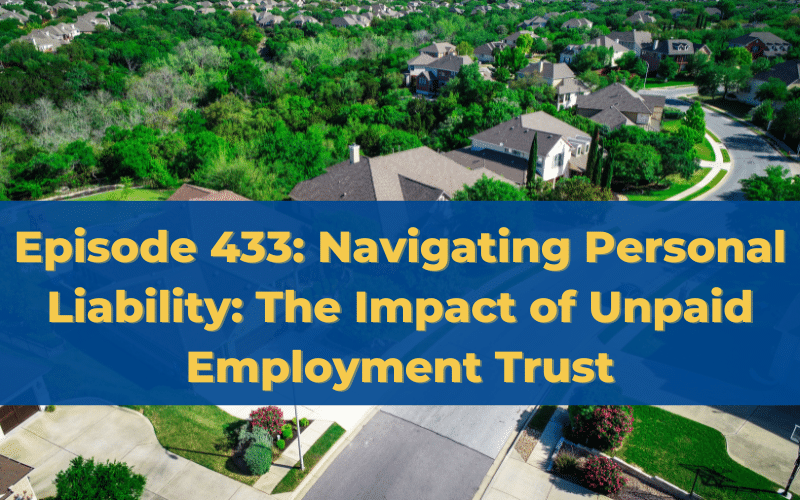Podcast: Play in new window | Download | Embed
Subscribe Apple Podcasts | RSS | Subscribe:
Trusts and wills are one way for a grantor to hand over their estate to a recipient of their choice. But many of us don’t have much to leave once we pass. Sometimes all the large property a grantor may have are a house and a car. The car title can be handled easily via a simple process through the local department of motor vehicles (DMV). While living, the grantor can complete a Beneficiary Designation Form. If this form has not been completed, a living heir of the decedent can submit an Affidavit of Heirship form to the local DMV.
For real property, such as a house, one of the best and easiest ways to leave your house to someone upon your death is what is called a “Lady Bird Deed.” The legal term for this type of deed is an Enhanced Life Estate Warranty Deed. It earned the name of Lady Bird Deed after Claudia “Lady Bird” Johnson, the wife of Former United States President Lyndon B. Johnson. Lady Bird used one of these deeds to transfer some of her real property to her daughter. The process was easy, effective, and legally recognized as a testamentary transfer. The name “Lady Bird Deed” was apparently catchy and much easier to say, thus the nickname stuck.
What exactly is a Lady Bird Deed? According to the associates at the Hap May firm, it is pure genius is what it is. Read on to know exactly how a Lady Bird Deed works, as well as knowing your rights under it (both as grantor and grantee).
Lady Bird Deed vs. Regular Warranty Deed
The long and short of it is that a Lady Bird Deed reserves the right for the grantor to revoke the transfer during the life of the grantor, whereas transfers under Warranty Deeds cannot be revoked once signed and recorded. Lady Bird Deeds are similar to wills — the grantor can change their mind anytime up to their death. Whoever is named as grantee under a Lady Bird Deed is automatically granted title to the house once the grantor passes. But grantee beware: the grantor is well within their right to execute a subsequent contradictory Lady Bird Deed for the same property to someone else. In that case, the first deed is revoked, and the original grantee has no more rights to the house at that point.
Take the following scenario of a client who came to an attorney. The client’s grandmother had passed away. The granddaughter had a deed in which her grandmother had conveyed to the granddaughter the grandmother’s house before the grandmother passed away. As if losing her grandmother wasn’t enough, she was being hailed to court pursuant to an eviction suit, from someone claiming to have ownership rights to the house – her mother (grandmother’s daughter).
Before the grandmother passed, and previous to the execution of granddaughter’s deed, the grandmother had executed a Lady Bird deed to her daughter, giving her daughter full ownership rights to the house upon grandmother’s death. Days after the deed was signed and recorded, the daughter left the state and her dying mother behind. In the daughter’s absence, the granddaughter chose to stay and live with her sick grandmother and take care of her grandmother who was battling cancer.
With her daughter gone, the grandmother began to rethink deeding her home to the daughter. Since the granddaughter had devoted herself to caring for the grandmother, and because the granddaughter was using the house as a primary residence, the grandmother decided to execute another Lady Bird deed on behalf of her granddaughter.
When the grandmother passed away a few months later, the granddaughter used the Lady Bird deed to execute an affidavit of ownership and filed both in the property records. The house now belonged to the granddaughter.
However, when the daughter heard of her mother’s passing, she argued the house was hers because she was deeded the property first and had recorded it in the property records well before the granddaughter’s deed. This left the daughter and granddaughter contesting ownership of the property.
Ultimately, who does the house belong to?
The answer is in the type of deed that the grandmother executed, a Lady Bird Deed. This is because there is a substantial difference between it and a regular warranty deed, one is revokable, and the other is not.
If the grandmother had executed a regular warranty deed when she deeded the house to her daughter, then the mother would be correct. Generally, the rule is “first in time, first in right” – meaning that if you receive a deed first, and record it in the property records, the grantor has nothing left to deed to anyone else. If the grandmother had granted a warranty deed to her daughter, the second deed to the granddaughter would have been essentially worthless. However, a Lady Bird deed includes a special provision that basically says a grantor maintains all rights to the property during their lifetime, to live in it, make changes to it, and to transfer or even sell it. And the grantor has the right to change their minds and revoke the deed at any time, without the permission of the grantee, at any time during the grantor’s lifetime. Revocation is as simple as executing another Lady Bird Deed on behalf of another grantee. Since the grandmother had granted a simple Lady Bird Deed to her daughter, executing another deed to the granddaughter legally revoked the deed to her daughter.
Therefore, the house legally belongs to the granddaughter.
The Genius of a Lady Bird Deed
The ability for a grantor to revoke a previously executed deed is a remarkable feature. The grantor can do so without the initial grantee having any say in the matter. The grantor needs no permission, and the person who was originally deeded the property does not even have to be aware of the change.
Revocation can happen in one of two ways:
- File a revocation in real property records that basically says, “I hereby revoke this deed.”
- Convey another Lady Bird Deed to someone else.
There is no Texas statute that supports the existence and validity of Lady Bird Deeds. The Lady Bird Deed is just a type of deed that is revokable. Yet courts have upheld their legality as a binding contract and testamentary instrument. Their primary purpose is to avoid the probate process for people that do not have much to their name beyond a house.
If a person passes away without having deeded their house to someone else, then the property must be passed on via probate – either through a will (if the decedent has one) or through intestate succession (divided among the decedent’s legal heirs). If a person dies without a will, a court must appoint a dependent administrator to be responsible for paying the decedent’s debts and going through the court every time they need to do something, such as list and sell a house. This can be expensive and cumbersome.
In Texas, if all a person has in their name is their house, executing a Lady Bird Deed is a smart way to avoid the hassle of probate. The grantee can deed the house to the beneficiary of their choice, but continue to live in it and have the power to do what they want with the house in their lifetime. A Lady Bird Deed also gives the grantor the freedom to change their mind until they pass, because the deed does not become effective until the grantor’s death.
After the grantor passes, the grantee simply has to take a death certificate and an affidavit and file the deed in the real property records.
Stipulations of the Lady Bird Deed
There are a few stipulations of the Lady Bird Deed, such as:
- While many states, like Texas, recognize this type of deed, not all of them do. If you don’t live in Texas, check that your state recognizes Enhanced Life Estate Warranty Deeds before you decide to use one to transfer property.
- It is subject to abuse. For instance, someone on their deathbed could be made to sign a deed under undue influence or trickery. In this case, the deed to a grantee could be set aside if it can be shown there was undue influence or fraud exercised on the grantor. An example of this can be if one child locks mom away and will not let other children see her just to ensure she gets mom to sign the deed to her.
- To be recognized, the deed must be properly notarized and filed in the county’s real property records.
Whether you are considering deeding your home to someone via a Lady Bird Deed, or if you think deed ownership should be contested, enlist the help of a reputable real estate attorney to determine your options.


